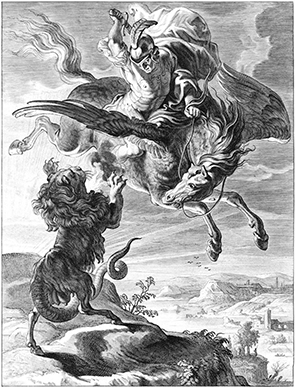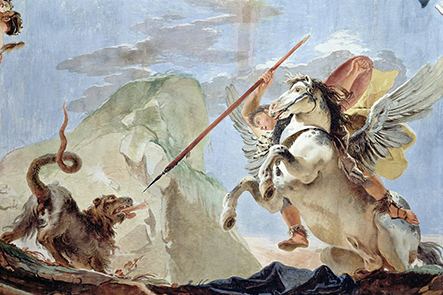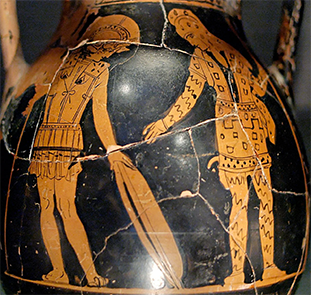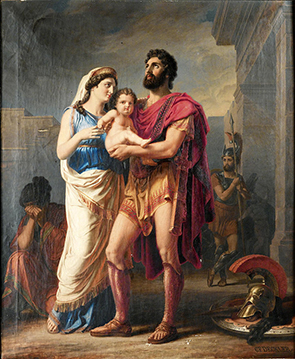

Book six focuses upon Hector’s return to Troy, but begins with a continued description of the battle from the previous book, and includes a digression into the family history of Glaucus, a fighter on the Trojan side.
As the book begins, the fighting continues. Initially, the narrative is mostly driven by lists of who kills whom: giant Ajax kills Acamas; Diomedes kills Axylus and his aide-in-arms; Bucolion’s twin sons are killed by Mecisteus; Polypoetes kills Astyalus; Odysseus kills Pidytes; Teucer kills Aretaon; Ablerus is killed by Nestor’s son, Antilochus; Agamemnon kills Elatus; Eurypylus kills Melanthius. These are mostly just names to the modern reader without much context, so the first page and a half of the book has little of the human drama that makes the story interesting.
But an incident takes places which reveals something of Menelaus and Agamemnon’s characters. Menelaus captures Adrestus after he falls from his chariot. Adrestus begs for his life and Menelaus prepares to have an aide take him as a prisoner back to the ships. But Agamemnon sees what is happening and intervenes. “No baby boy still in his mother’s belly, / not even he escape,” he tells Menelaus. Agamemnon kills Adrestus with his spear.
Nestor senses the battle is going in favour of the Argives and he urges his men to push forward and resist plunder until after a victory is secured. Helenus, son of Priam and a seer, also sees how the battle is going. Some of the Trojan troops have begun to flee back to the city. Helenus urges Hector and Aeneas to move among the troops and rally them. And once this is done, he urges that Hector return to the city to get his mother and the older women to make an offering to Athena – the finest robe spread across the knees of the god’s statue – as well as a sacrifice of twelve heifers, in the hope that the god will take pity on them and hold back Diomedes. Diomedes is now considered the strongest of the Argives, even fiercer than Achilles.
Hector helps rally the troops and the Argives falter and fall back. As Hector turns for home, Diomedes faces Glaucus in battle. However, Diomedes is cautious, for he does not know if Glaucus is a god. He remembers the fate of Lycurgus who attacked the maenads, Dionysus’s nurses, and was blinded by the gods as punishment. Diomedes says he will only fight Glaucus if he is a mortal. To assure Diomedes, Glaucus offers him his family history.
Glaucus tells Diomedes the tale of Bellerophon, son of Glaucus and grandson of Sisyphus. Bellerophon was Glaucus’s grandfather.
Bellerophon was blessed with good looks and was faultless in character. But Proetus, the king of Tiryns, was persuaded by his wife, Antea that Bellerophon lusted after her. In fact, Bellerophon had rejected her, and her lie was in revenge for this. But Proetus was loathe to kill Bellerophon so he sent him to Lycia with “tokens, murderous signs, scratched in a folded tablet”, encouraging Lycia’s king, Antea’s father, to kill Bellerophon. The king feasted Bellerophon for nine days, but then asked to be presented with “credentials”. When he read Proetus’ message he was also reluctant to kill Bellerophon, so he set him several dangerous tasks. He ordered Bellerophon to kill the Chimaera, which he did. Next, he was ordered to fight the Solymi, whom he defeated in battle, and then the Amazons after that. Finally, the king had him ambushed, but Bellerophon killed all his attackers. Having achieved all this, the king saw the quality of Bellerophon. He awarded him his daughter’s hand in marriage, gave him royal honours and awarded him property. He had three children with his wife – Isander, Hippolochus and Laodamia (who later bore Sarpedon with Zeus) – but when Bellerophon later lost the favour of the gods, they hunted down and killed Isander and Laodamia. Hippolochus remained and fathered Glaucus.
After hearing Glaucus’ story, Diomedes realises that his own grandfather, Oenus, once hosted Bellerophon, and so he considers Glaucus a friend. He suggests that they not fight each other, but that each continue to fight against each other’s army while avoiding each other. As a sign of this pact, he suggests they trade each other’s armour, although Diomedes has the best of this trade, since Glaucus’ armour contains gold and is far more valuable.
Hector returns to Troy and is accosted by women desperate to know about their men in the field. He enters his father’s palace where he is welcomed by his mother, Hecuba. Hector refuses the wine she offers, fearing to blunt his edge in war. He asks his mother to make the offering and sacrifice to Athena, suggested by Helenus, in the hope of stopping “that invincible headlong terror”, Diomedes. He next decides to look for Paris, whom he openly despises and wishes dead.
Hecuba gathers the older women of the city and selects the best robe from the storeroom to offer Athena. At Athena’s shrine, Theano, Antenor’s wife and priestess to Athena, spreads the robe upon the knees of the goddess’s statue and offers twelve heifers if Diomedes can be stopped. But Athena ignores her pleas.
Meanwhile, Hector finds Paris in Helen’s bedroom along with the women of the house, polishing his splendid armour. Hector admonishes Paris for doing this while other men die for his cause. Paris says he had plunged himself in grief, but Helen has talked him out of it and he was about to return to battle. For her part, Helen is again full of self-contempt, calling herself a “bitch” and a “whore”. But she is also critical of Paris, saying she wishes she had had a better husband. Even so, she anticipates that she will be remembered in song.
Hector asks Helen to rouse Paris. In the meantime, he will visit his own family before returning to battle. But Hector doesn’t find his wife Andromache, in their house. A servant tells him she has gone to the Scaean Gate in panic after hearing of the setbacks of the Trojan army. Hector finds her there with their son, Scamandrius (also called Astyanax). Hector’s love for him is evident. Andromache expresses her fears for Hector, and the likelihood he will leave their son without a father. And because Hector is the only family she has left, since her father was killed by Achilles and her mother was killed by arrows after she was released by Achilles and returned to her father’s halls. Andromache begs Hector to instead defend the walls of Troy at the weakest part of the city. But Hector is fatalistic, believing Troy will inevitably fall, and he cannot bear to be thought a coward. Yet what troubles him most is the thought that when Troy falls Andromache will be captured and made a slave, and displayed as the wife of dead Hector. He would rather die before that happened. Hector tries to nurse his son, but must first remove his war helmet because it scares him. Hector prays that Scamandrius will grow into a better man than him. As Hector leaves, he asks Andromache to keep the women occupied. When he leaves, the women lament that they are not likely to ever see him alive again.
Paris leaves Troy in high spirits, wearing his polished armour. He knows how good he looks. He catches up with Hector as he leaves the city to return to battle. Hector now feels more generous towards him. He tells Paris that he is a good soldier and that he should take care not to give the men further reason to hold him in contempt.
The sixth book of The Iliad provides us with some stark contrasts. We have the mercy shown by Menelaus to Adrestus and the pitiless response of Agamemnon. We have the nobility and courage of Hector contrasted to the foppish indolence of Paris. And Homer also provides us with a digression into the family history of Glaucus, which not only tells a tale of bravery and honour, but also sets up a surprising pact between Diomedes and Glaucus: that they will refrain from fighting each other. Book 6 showcases human nature at its extremes, not only in the actions of its characters, but in the contrasting settings: the bloody field of battle and the private moments of family life.
Agamemnon does not have a large part in this book of The Iliad. He is mainly notable for his extreme reaction to the mercy shown by Menelaus to Adrestus. Not only does he insist that Adrestus be killed (and does it himself) his address to Menelaus shows the extremes of his animus for the Trojans:
This is an extreme which is on par with Herod’s fabled slaughter of the innocents or awful tales told about Nazis killing babies in World War II. It holds no hope and offers no means for future rapprochement.
Compare this to the reconciliation between Glaucus and Diomedes, which is effected by the discovery of their grandfather’s friendship and hospitality alone. Diomedes is willing to fight any mortal man, but his action in offering Glaucus a pact to avoid fighting each other shows that the war has not become a personal vendetta for him. It does not represent the high stakes that Agamemnon feels: reputational honour and military dominance.
This representation of Diomedes is at odds with the fear his name has come to imbue in the Trojans. Hector tells Hecuba:
Later Hector repeats his epithet: “that invincible headlong terror!” (line 329) to Hecuba.
Yet, while Diomedes is formidable on the battle field, it is evident to us that his actions are more noble and less monstrous than the war itself, or those who promote him to action, like Athena, as argued by Ares in Book 5.
The tale that Glaucus tells to Diomedes on the battlefield about his grandfather, Bellerophon, is a peculiar break in the action of the battle. It is hard to imagine in reality two men about to fight each other speaking so rationally and listening so patiently. But Glaucus’ tale offers a model of honour and bravery. Bellerophon is betrayed by his would-be lover, Antea. Glaucus’ telling of the story suggests it is Bellerophon’s character that makes it difficult for either king to kill him outright. The trust he wins with the Lycian king is as a result of his bravery and character.
Homer’s telling of the story through Glaucus, however, has a few grey areas and omits some interesting detail. For instance, when the king (King Iobates: a detail Homer omits) sends Bellerophon to kill the chimaera, he first tames Pegasus, the flying horse, and uses his aerial advantage to kill the chimaera.
Glaucus’ version on the story is also vague about Bellerophon’s eventual fate:
Why he is hated, if we only follow Homer, we do not know. We can assume the detail is omitted because Homer’s audience could have been trusted to know it. The tale that is omitted resembles the story of Icarus. Bellerophon unwisely tried to fly Pegasus to Olympus, and for his presumption Zeus sent a gadfly to sting Pegasus, causing Bellerophon to fall to earth. Of course, this aspect of the story also shows us that Bellerophon was not perfect, which is not the intent of the story that Glaucus relates to Diomedes. Glaucus’ story also suggests his own honour and status, apart from prompting Diomedes to act nobly in return (even though he comes out best in the trade of armour).
Helen continues to be a tragic figure, although this book adds no complexity to her character. Her self-scorn, witnessed first in book 3, continues, although she openly speaks scornfully of Paris, too. Helen is without hope. When she speaks of being remembered in song, it is not a boast or pride that makes her say it. She sees her marriage with Paris as a “killing doom”, a shameful act from which she will not be able to escape, even in death: “so even for generations still unborn / we will live in song.” (Book 6, lines 425 – 426)
Paris remains a figure for ridicule, although Hector finds it in himself to give him some praise when he returns to the battlefield. But Paris is constantly associated with Helen and her women or his bright armour: “his splendid battle gear”; “his elegant gleaming bronze”. Compare this to Hector, who refuses wine from his mother and says he is unable to make offerings to Zeus, since he is “splattered with blood and filth”. When Paris leaves Troy to return to the battlefield, his armour and demeanour are likened by Homer to a prize racehorse:


These two images provide a detail to the story of Bellerophon that is omitted in Glaucus’ account: his use of Pegasus to slay the Chimaera and win his other battles. Instead, Glaucus’ account focuses upon the terrifying nature of the Chimaera – a monster Bellerophon defeats by tipping lead into its mouth so that its own hot breath would melt it into its insides. By omitting the detail of Pegasus, Glaucus also avoids the details of Bellerophon’s fall from grace with the gods.

Given the tenor of the story of Glaucus and Diomedes, these few lines offer a strange little coda that do not seem to be the point of the rest of the story. The suggestion is that Diomedes has outwitted Glaucus, even though the pact they swear seems to uphold the values of honour prevalent in this society. It is an odd little detail given to us by Homer at the end of this story which adds nothing to it, except to undercut the magnanimity of Diomedes’ offer. I am not sure what to make of it.

The scene before Hector returns to the battle is poignant. Hector finds Andromache, his wife, and his son Scamandrius (also called Astyanax) at the Scaean Gate. This is the same location from which Helen and Priam observe the armies in book 3. The scene foreshadows Hector’s later death. Neither Andromache’s attending women nor Andromache believe he will return. Andromache has begged him to hold back from the worst of the fighting. This painting captures some of that tragic poignancy. Hector does not believe Troy can withstand the Achaean forces forever and he also expects to die, although he dreads the thought of his wife being enslaved. He does not seem to be able to imagine his son’s eventual fate (the potential of which has been hinted by Agamemnon’s words to Menelaus (“No baby boy still in his mother’s bell / Not even he escape”). Instead, he says a prayer for his boy, which is the moment that Deckler’s moment seems to capture:
It is a prayer that seems full of hope, but read in the context of his fears for his wife and his certainty that Troy will fall, it is rather imbued with sadness and a sense of denial. Hector cannot face this last reality. His story spans both the martial and domestic scenes in the story, and possibly is its best representation of the personal cost of war.
Comments
No one has commented yet. Be the first!